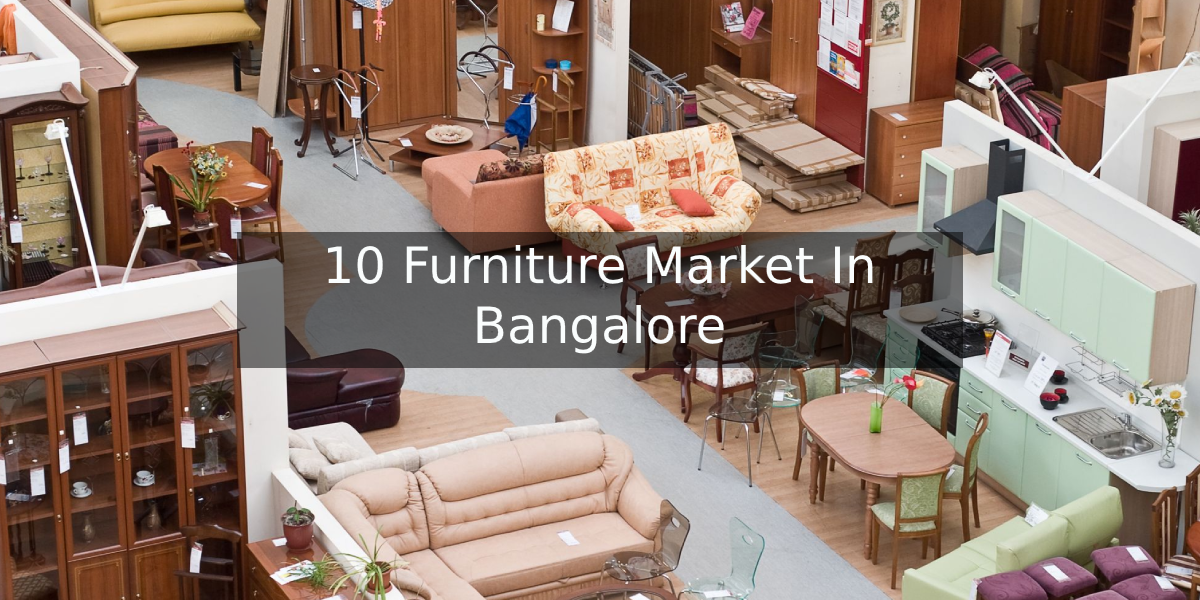Business
Top 10 Furniture Markets In Bangalore

Planning to decorate your home without breaking the bank? Working on your home is a long and complex process, but with the right furniture, it feels all worth it. Whether you want to upgrade your space functionality or want to reflect your personality, the right piece of furniture does the trick.
However, the question remains, where to get pocket-friendly furniture from? Well, Bangalore is your ultimate destination. From bustling markets to customization spots, this city has something for everyone’s taste and needs. To be more precise, here are some best furniture markets in Bangalore to opt for.
Affordable Furniture Market in Bangalore
Here is the best wholesale furniture market in Bangalore where you can get your hands on amazing deals and quality pieces:
1.Commercial Street Market
Commercial Street Market is the best wholesale furniture market in Bangalore. Whether you want vases to decorate your table or chairs to cosy up corners of your space, it has several stores for home decor and furniture. The market is full of both new as well as refurbished furniture stores.
Additionally, you can also find stock office furniture, all at affordable rates. You may also end up buying antiques for great additions to your home and to add a subtle look. Whether you want furniture for just one room or your entire home, this market guarantees it will not cross your budget.
- Hours: 10:00 am to 09:00 pm
- Closed day: Sundays
- Nearest metro station: MG Road
- Bus routes: 126 and 267
- Parking: Paid parking
- Nearby markets include: Lalbagh Market and City Market
- Food availability: Eateries and coffee shops
2.Shivaji Nagar
When it comes to repurposing old furniture, Shivaji Nagar in Bangalore is your ideal spot. It has markets on two sides of Central Street with furniture stores on both sides. The market has a huge number of stores, each selling high-quality furniture of different materials and sizes.
In addition to old furniture, mirrors, collectors and home accessories. Being the main furniture market in Bangalore, you also expect here to create the furniture you want, thanks to the tailor-made options many furniture stores offer. Every penny spent on furniture from this market is worth it.
- Hours: 10:00 am to 09:00 pm
- Closed day: Sundays
- Nearest metro station: Cubbon Park Metro Station
- Bus routes: 330-M and 276A
- Parking: Street and paid parking
- Nearby markets include: City Market and Lalbagh Market
- Food availability: Street vendors and restaurants
3.Peenya Industrial Area Furniture Market
Peenya Industrial Area Furniture Market is the best furniture market in Bangalore. Whether you need small furniture or large ones, this is the market you should head to for all your needs. Here they make furniture from scratch which means you can opt for customized pieces. From modern wooden ladders, benches and small divans to dressers, all are abundant here.
In addition to furniture, it has everything your household needs like curtains, wardrobe hangers, etc. Moreover, you can also get your dream furniture custom-made in any of these stores. Just make sure you know the design and material you want. Besides, you can also save a huge amount of money as you’ll be buying directly from the source.
- Hours: 09:00 am to 07:00 pm
- Closed day: Sundays
- Nearest metro station: Peenya Industry Metro Station Purple Line
- Bus routes: 210A and 410C
- Parking: Available
- Nearby markets include: Rajajinagar Market and Malleswaram Market
- Food availability: Local eateries and food stalls
4.SP Road
Whether you are designing or redesigning your home, SP Road in Bangalore is your one-stop destination. From individual business owners to designers, the wide array of stores here have something for everyone under one roof. Here you will find both branded and non-branded furniture at reasonable prices.
Whether you want European-style furniture or rustic-design furniture, the furniture here will add the look you want for your home. Moreover, if you get confused with the wide variety of options, you can seek advice from the local artisans and staff there. All our highly knowledgeable and can be your guide for the day.
- Hours: 10:00 am to 08:00 pm
- Closed day: Sundays
- Nearest metro station: Majestic
- Bus routes: 258-DN and 258-H
- Parking: Available
- Nearby markets include: Lalbagh Market and City Market
- Food availability: Restaurants and small stalls
5.Bommanahalli Furniture Market
Another best wholesale furniture market in Bangalore is Bommanahalli Furniture Market. Keeping with the generation charm of the locality, the furniture stores here are equipped with all styles of furniture. From large furniture like sofas and beds to small furniture like footstools and work desks, they have everything for you.
The furniture sold here is known for withstanding the test of time. Simply put, when looking for smaller furniture, this is your ultimate destination. Using your bargaining skills, you can strike the best deal on the furniture you want for your home.
- Hours: 10:00 am to 08:00 pm
- Closed day: Sundays
- Nearest metro station: Silk Institute
- Bus routes: 258-M and 258-DN
- Parking: Yes but limited
- Nearby markets include: Lalbagh Market and City Market
- Food availability: Restaurants and cafes
6.Brigade Road Market
Another great furniture market in Bangalore is the Brigade Road market. With several branded and non-branded stores, it has something for everyone. Once you step into the market, you’ll be wowed by the beautifully furnished furniture.
From sofas to tables, every piece they sell is a statement in itself. It not only decorates your home but also enhances its aesthetic appeal. The best part? It won’t even cost you much. Simply put your end for the kind of furniture you want ends with this market.
- Hours: 10:00 am to 09:00 pm
- Closed day: Sundays
- Nearest metro station: MG Road Metro Station
- Bus routes: 335-N and 13C
- Parking: Minimal space
- Nearby markets include: Lalbagh Market and City Market
- Food availability: Restaurants and cafes
7.Balepet Furniture Market
Balepet Furniture Market is a renowned wholesale furniture market in Bangalore. The moment you enter the area, you’ll find yourself surrounded by various large furniture and retail stores. Each furniture store has a wide variety of items at reasonable prices. It is the best location for those seeking to purchase furniture in bulk but at affordable prices.
The more you explore, the better deal you get and don’t forget to use your bargaining skills. The best part is that they offer amazing discounts for those seeking furniture in bulk. So why wait when you can get maximum discounts without compromising on the quality?
- Hours: 10:00 am to 08:00 pm
- Closed day: Sundays
- Nearest metro station: Chickpet Market Station
- Bus routes: KIA-9
- Parking: Yes but limited
- Nearby markets include: City Market and Lalbagh Market
- Food availability: Small restaurants and street food vendors
8.Infantry Road Furniture Market
One more renowned furniture market in Bangalore is the Infantry Road furniture market. For generations, local traders and designers have been running furniture stores here. From vintage mirrors to reasonably priced statement pieces for your home, the market has something for all.
In addition to second-hand furniture, you will also find here some unique antiques and vintages. Using your bargaining skills, you can also uncover the best deals on everything. In addition to exploring and choosing the furniture you want, you can also get the furniture you want delivered to your doorstep.
- Hours: 10:00 am to 8:00 pm
- Closed day: Sundays
- Nearest metro station: Cubbon Park
- Bus routes: 126 and 139
- Parking: Street parking
- Nearby markets include: City Market and Sudhama Nagar Market
- Food availability: Restaurants and food stalls
9.Jayanagar Furniture Market
For those seeking rustic home decor, Jayanagar Furniture Market is the best shopping market in Bangalore. It is one of the city’s oldest neighbourhoods and caters to everyone’s needs. From sophisticated bamboo, wicker and cane items to wooden furniture, this market has a unique charm.
The market has both local businesses and stores selling furniture from local artisans and international brands. Whether you are working from home and need a chair or want to relax after work and need a comfortable sofa, they have it all. Besides, the furniture they sell is both quirky and affordable.
- Hours: 10:00 am to 09:45 pm
- Closed day: Sundays
- Nearest metro station: Jaya Prakash Nagar
- Bus routes: 201R and 210-E
- Parking: Available
- Nearby markets include: Lalbagh Market and Sudhama Nagar Market
- Food availability: Restaurants and street foods
10.JC Nagar Furniture Market
Another best option when looking for a trusted furniture market in Bangalore is JC Nagar Furniture Market. It offers a wide variety of branded and non-branded furniture at affordable price ranges. This market also has some of the most trusted furniture stores.
However, each store offers furniture of different materials, sizes, colours, features and more. You can also order customised furniture for your needs and at affordable budget options. Besides, the stores here also have movers who will get your furniture loaded and transported to your desired location.
- Hours: 10:30 am to 09:00 pm
- Closed day: Sundays
- Nearest metro station: Gokalpuri Market
- Bus routes: 380 and 165
- Parking: Available
- Nearby markets include: Loni Market and Yamuna Vihar Market
- Food availability: Street food and restaurants
Create Your Dream Home Today
Be it for offices or homes, the wholesale furniture market in Bangalore offers diverse options. Each store caters to all your needs and makes sure you achieve the look you want. When shopping you’ll come across high-quality furniture and will be amazed knowing they won’t dig a hole in your pocket.
Business
How to Start a Small Business Online (Step-by-Step Guide)

In today’s digital world, launching an online business isn’t just a dream—it’s a realistic and potentially life-changing opportunity. Whether you’re looking to quit your 9–5 job, earn passive income, or build something impactful, knowing how to start a small business online is the first step.
This comprehensive step-by-step guide will walk you through everything you need to know—from finding the right business idea to launching, marketing, and scaling your venture successfully.
Why Start a Small Business Online?
Starting a small business online comes with unmatched advantages:
-
Low startup costs: No rent, utilities, or hefty upfront investments.
-
Global reach: Sell to customers anywhere in the world.
-
Flexibility: Work from anywhere, set your hours.
-
Scalability: Start small, grow big without physical limitations.
-
Automation: Use tools to automate sales, marketing, and customer service.
If you’re serious about building an income stream or pursuing entrepreneurship, learning how to start a small business online is one of the smartest skills you can develop.
Step 1: Identify a Profitable Business Idea
Every successful business starts with a profitable idea that solves a real problem. Start by asking:
-
What skills or hobbies do you have?
-
What problems can you solve?
-
What products do people search for online?
Popular Online Business Ideas:
-
Dropshipping store
-
Print-on-demand products
-
Online courses or coaching
-
Affiliate marketing blog
-
Digital products (ebooks, templates, etc.)
-
Freelance services (writing, design, coding)
Tip: Your idea should sit at the intersection of passion, skill, and market demand.
Step 2: Validate Your Idea with Market Research
Before investing time or money, validate your idea:
1. Check Search Demand
Use tools like Google Trends, Ubersuggest, or Ahrefs to check whether people search for your product or service.
2. Analyze Competitors
Find your top 5 competitors. What are they doing well? Where are they lacking?
3. Look for Gaps
Join forums, Facebook groups, Reddit communities. What are people asking for that they’re not getting?
4. Test with a Survey
Create a free survey using Google Forms or Typeform. Share it in relevant groups to gather insights.
Validation is the key to minimizing risk in your online business journey.
Step 3: Choose a Business Model
Now that you have a validated idea, it’s time to pick your online business model. This will define how you deliver value and make money.
Common Online Business Models:
| Model | Description |
|---|---|
| E-commerce | Sell physical or digital products via online store |
| Dropshipping | Sell products without handling inventory |
| Freelancing | Offer services like writing, SEO, design, etc. |
| Subscription-based | Charge a recurring fee for content or products |
| Affiliate marketing | Promote others’ products and earn a commission |
| Online coaching/courses | Teach a skill or subject to paying students |
Pick a model that aligns with your strengths, budget, and long-term goals.
Step 4: Register Your Business
While starting small might seem informal, registering your business gives it legitimacy and helps avoid legal issues later.
Steps to Register Your Business:
-
Choose a Business Name – Make sure the domain is available.
-
Register a Domain – Use platforms like GoDaddy or Namecheap.
-
Register the Business Legally – Depending on your country, choose a structure (LLC, Sole Proprietorship, etc.).
-
Apply for a Tax ID (if required) – Essential for opening business bank accounts and paying taxes.
Step 5: Build Your Online Presence
You can’t run an online business without a solid digital presence. This includes:
1. Create a Website
Your website is your online storefront. Use platforms like:
-
Shopify – Best for eCommerce.
-
WordPress – Best for blogging and customization.
-
Wix/Squarespace – Beginner-friendly drag-and-drop builders.
2. Design Your Branding
-
Logo
-
Color palette
-
Typography
-
Tone of voice
Consistent branding builds trust and recognition.
3. Set Up Social Media
Start with 2-3 platforms where your audience hangs out (Instagram, Facebook, LinkedIn, Pinterest, etc.)
Step 6: Set Up Online Payment and Fulfillment
To make money, you need a secure payment gateway and delivery system.
Accepting Payments:
-
Stripe (global)
-
PayPal
-
Razorpay/Paytm (India)
-
Shopify Payments
For Physical Products:
-
Set up shipping rates.
-
Partner with logistics companies (Shiprocket, DHL, FedEx).
-
If dropshipping, use tools like Oberlo, Spocket, or DSers.
For Digital Products:
-
Use platforms like Gumroad, SendOwl, or Teachable.
-
Deliver via email or private members’ area.
Step 7: Launch and Promote Your Business
Now that everything is set, it’s launch time!
1. Soft Launch
Share with friends, family, or a small beta audience. Gather feedback.
2. Full Launch
Announce on social media, run ads, and email your list.
Promotion Strategies:
-
SEO: Optimize your site with keywords like “How to Start a Small Business Online”
-
Content Marketing: Write blogs, create videos, offer value
-
Social Media Marketing
-
Influencer Outreach
-
Email Campaigns
-
Paid Ads (Google, Facebook, Instagram)
Step 8: Monitor, Optimize, and Scale
You’ve launched—great! But the real work begins now.
Key Metrics to Track:
-
Website traffic (Google Analytics)
-
Conversion rate
-
Cost per acquisition (CPA)
-
Email open and click rates
-
Customer retention and satisfaction
Tools to Use:
-
Google Analytics
-
Hotjar (behavior tracking)
-
SEMRush or Ubersuggest (SEO)
-
HubSpot or Mailchimp (email marketing)
Scale by:
-
Adding new products or services
-
Running retargeting ads
-
Automating your sales funnel
-
Hiring a virtual assistant or freelancers
Common Mistakes to Avoid When Starting an Online Business
-
Skipping market research
-
Choosing a niche you’re not passionate about
-
Not investing in branding and user experience
-
Overcomplicating the tech stack
-
Ignoring customer feedback
-
Not collecting emails from day one
-
Being inconsistent with content and marketing
FAQs on How to Start a Small Business Online
Do I need technical skills to start a business online?
No. Many platforms are drag-and-drop. You can also hire freelancers for tech tasks.
How much money do I need to start?
Anywhere from ₹5,000 to ₹50,000, depending on your model. Digital products and freelancing are cheaper to start.
Can I start while working a full-time job?
Absolutely. Many online businesses are built part-time and scaled later.
Is it necessary to have a registered company?
Not initially, but it’s recommended as you grow for legal and financial purposes.
What is the easiest online business to start?
Freelancing, affiliate marketing, and dropshipping are among the easiest.
Final Thoughts
Learning how to start a small business online is a game-changer. It opens doors to independence, freedom, and unlimited growth potential. The key is to take it step by step:
-
Start with a strong idea,
-
Validate it,
-
Choose the right model,
-
Build your presence,
-
Market smart,
-
Keep learning and adapting.
Success won’t happen overnight, but with consistency and smart strategy, you can build something powerful and profitable.
So what are you waiting for? Your online business journey starts now.
Business
UnderstandingGPT-44X Amazon’s

Amazon’s GPT-44X is a groundbreaking advancement in artificial intelligence and natural language processing, enhancing language model capabilities and rooted in AI history.
Evolution of Artificial Intelligence in Language Models
Prior to digging into the details of GPT-44X, it is important to comprehend the direction that artificial intelligence is taking in the field of language modelling. Artificial intelligence (AI) has developed throughout time from simple rule-based systems to complex neural networks that can comprehend and produce writing that is similar to that of a person.
Understanding GPT-44X
Amazon developed the cutting-edge language model GPT-44X, also known as “Generative Pre-trained Transformer 44X.” Expanding on the achievements of its forerunners, including GPT-3, GPT-44X pushes the limits of natural language creation and interpretation.
Applications of GPT-44X
GPT-44X has a wide range of applications that cover several use cases and industries. Its ability to create excellent, cohesive writing in a variety of genres and styles makes content creation and generation one of its principal uses.
Additionally, GPT-44X finds use in chatbots and customer service, which offer human-like interactions and effectively handle inquiries. Its capacity to understand context and produce replies that are appropriate for the given situation makes it indispensable for improving user experiences.
Furthermore, GPT-44X is the brains of personalised recommendation systems, which leverage user preferences to promote goods, services, or content based on specific requirements.
Implications of GPT-44X
The introduction of GPT-44X has important ramifications, both favourable and unfavourable. On the one hand, it offers enterprises previously unheard-of chances to boost consumer interaction, simplify processes, and spur innovation.
It also brings up moral questions about algorithmic biases, disinformation, and data privacy. Addressing these ethical issues is critical to ensuring responsible AI deployment as GPT-44X becomes more commonplace.
Advantages and Disadvantages
The ability of GPT-44X to understand context, generate language that sounds natural, and adapt to new tasks with little to no fine-tuning is impressive.Its adaptability and scalability make it a valuable tool for companies looking to improve user experiences and automate procedures.
However, GPT-44X is not without its shortcomings. Data privacy, possible abuse, and bias persistence are concerns that highlight the need for careful deployment and continuous monitoring.
Future Outlook
Going forward, GPT-44X’s future is bright yet difficult. With AI developing at a rapid pace, GPT-44X is expected to be a key component of the intelligent systems of the future. To reach its full potential, though, negotiating the complicated ethical, social, and technical environments will be necessary.
Conclusion
Although it has many and potentially revolutionary uses, its advantages must be used appropriately, which requires rigorous assessment of the ethical ramifications and responsible implementation.
FAQs
What industries can benefit from GPT-44X?
Many diverse domains, including e-commerce, healthcare, banking, and education, can leverage GPT-44X for varied purposes. Any sector depending on language-based communication and content production may utilise the advantages of GPT-44X to increase efficiency and creativity.
How does the GPT-44X compare to previous models?
In comparison with earlier models, GPT-44X has improved natural language creation and comprehension skills. Better training methods and a bigger model size enable GPT-44X to perform better on a range of tasks and domains.
What are the ethical concerns surrounding GPT-44X?
Data privacy, false information, algorithmic biases, and possible abuse are some of the ethical problems of GPT-44X. Transparent governance, strong rules, and continuous research are necessary to address these issues, reduce dangers, and guarantee the responsible deployment of AI.
Is GPT-44X accessible for small businesses?
GPT-44X provides promise for corporations but needs time, energy, and skill. Smaller organisations may use it through bespoke or cloud-based solutions.
Business
China SEO Xiaoyan

China SEO Xiaoyan is a prominent figure in the expansive Chinese SEO (search engine optimisation) scene. This cutting-edge technology has completely changed the game for Chinese firms when it comes to search engine optimisation (SEO). It provides unmatched insights and tactics for thriving online.
Importance of Xiaoyan
Created with the Chinese market in mind, Xiaoyan is an AI-powered virtual assistant. Its principal use is to improve a website’s exposure and position on Baidu, Sogou, and Shenma, three of the most prominent search engines in China.
How Xiaoyan Works
Xiaoyan relies on complex technologies like NLP and semantic understanding to function. Xiaoyan is able to understand user intent and provide appropriate search results by analysing their queries and behaviours.
Key Features of Xiaoyan
Semantic Understanding
Xiaoyan stands out due to its outstanding comprehension of the Chinese language and context. Search results are more closely aligned with user intent than with simple keyword matching.
Natural Language Processing
Xiaoyan is able to decipher intricate questions and glean useful information through the use of sophisticated natural language processing algorithms. As a result, websites may improve their content optimisation for conversational search inquiries.
User Intent Analysis
One important part of current SEO is recognising user intent, and Xiaoyan does an excellent job of that. Websites may increase their organic traffic and engagement metrics by prioritising content that caters to user requirements and preferences.
Xiaoyan’s Impact on Chinese SEO Strategies
Businesses in China have adapted their SEO tactics to take advantage of Xiaoyan’s new features, which have changed the landscape of search engine optimisation.
Content Optimisation
With Xiaoyan’s emphasis on semantic understanding, content creators must focus on producing high-quality, contextually relevant content. This involves incorporating relevant keywords naturally and structuring content to address user queries effectively.
Voice Search optimisation
The need to optimise for voice inquiries is growing in importance as voice search becomes more prevalent in China. With Xiaoyan’s natural language processing (NLP) features, websites may enhance their content for voice search results by making it more visible in linguistic searches.
Mobile Optimisation
Xiaoyan stresses the need for mobile optimisation because of China’s mobile-first internet consumption strategy. For a consistent experience across all platforms, websites need to be mobile-friendly and load quickly.
Challenges and Opportunities with Xiaoyan
Although Xiaoyan has great promise for enhancing China’s SEO performance, it does come with its fair share of difficulties.
Language and Cultural Barriers
Implementing Xiaoyan for Chinese SEO might be challenging for foreign firms due to language and cultural hurdles. To succeed in China, you must master localization and know what Chinese consumers want.
Opportunities for International SEO
In spite of obstacles, Xiaoyan provides opportunities for foreign companies interested in penetrating the Chinese market. International businesses may increase their profile in China by forming partnerships with local specialists and taking advantage of Xiaoyan’s services.
Best Practices for Leveraging Xiaoyan in SEO
Companies may get the most out of Xiaoyan if they adhere to these guidelines:
High-Quality Content Creation
Pay close attention to providing interesting and educational information that will appeal to Chinese viewers. In order to gain the confidence and credibility of your users, prioritise quality above quantity.
Optimisation for Long-Tail Keywords
Find user-specific inquiries and preferences, and then go for those long-tail keywords. Opportunities to rank better in Xiaoyan’s search results exist for these particular terms.
Localised SEO Strategies
Adjust search engine optimisation tactics to meet the specific needs of different regions and consumers across China. In order to localise well, one must comprehend local languages, cultural subtleties, and search patterns.
Case Studies: Successful Implementation of Xiaoyan
Xiaoyan has been an integral part of several sectors’ successful search engine optimisation campaigns.
E-commerce Sector
In order to increase product exposure and conversions, leading e-commerce platforms utilise Xiaoyan. They make it easy for customers to shop by improving product listings and giving them tailored suggestions.
Travel and Tourism Industry
Brands in the travel industry use Xiaoyan to give customers personalised suggestions and information. They increase traffic and reservations by making content more visible in search results for users’ locations and other travel-related inquiries.
Future Trends in Xiaoyan and Chinese SEO
Xiaoyan has great potential to develop further and influence how Chinese SEO is shaped in the future.
Integration with AI and Machine Learning
If Xiaoyan wants to get better at understanding user intent and providing more tailored search experiences, it will keep incorporating cutting-edge AI and ML technology.
Expansion to Other Industries
The impact of Xiaoyan will go beyond the realms of online shopping and tourism to touch other sectors, such as banking, medicine, and academia. Xiaoyan will help businesses in all kinds of industries interact with customers and improve their online presence.
Conclusion
Finally, look no further than China SEO Xiaoyan for all your search engine optimisation needs. With its cutting-edge features and insightful data, it helps companies succeed in China’s intricate market. There are fresh development and success chances in China’s digital ecosystem for organisations that embrace Xiaoyan and use personalised SEO methods.
FAQs on China SEO Xiaoyan
What is China SEO, Xiaoyan?
If you want your website to rank higher in Chinese search results, you need China SEO Xiaoyan, an AI-powered solution.
How does Xiaoyan differ from traditional SEO tools?
Xiaoyan uses advanced technologies like natural language processing and semantic comprehension to provide users with search results that are extremely relevant to their purpose.
What are the key features of Xiaoyan?
Semantic understanding, natural language processing, and user intent analysis are some of Xiaoyan’s most valuable capabilities that help companies optimise their content.
How can businesses leverage Xiaoyan for SEO?
Xiaoyan is suitable for businesses that produce high-quality content, optimise it for long-tail keywords, and employ local SEO strategies.
What are the future trends in Xiaoyan and Chinese SEO?
Beyond e-commerce and tourism, Xiaoyan is anticipated to increase its use of AI and ML and broaden its impact to other sectors.


















